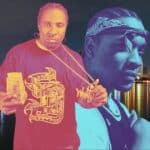Hip-hop, a genre of music that originated in the United States, has become a global phenomenon, with countries all over the world embracing and adding their unique flavor to the genre. France, in particular, has a thriving hip-hop scene growing since the 1980s. French hip-hop, also known as rap, has become an integral part of the country’s cultural identity, with many French artists achieving international success.
The history of hip-hop in France dates back to the early 1980s when radio shows dedicated to the genre began to emerge in Paris. These shows, such as “Rapper Dapper” and “Funk à Billy,” helped to popularize hip-hop in the country. 1982 the New York City Rap Tour travelled to France, featuring legendary artists like Afrika Bambaataa, Grandmixer DST, and Fab 5 Freddy. This tour was a pivotal moment for French hip-hop, as it exposed the genre to a broader audience and inspired many young French artists to start making their music.
Today, French hip-hop has evolved into a diverse and vibrant scene, with artists from all over the country contributing to the genre. DJs and producers play a crucial role in the French hip-hop scene, with many working closely with rappers to create innovative and exciting music. With its unique blend of French and American influences, French hip-hop has become a cultural force to be reckoned with, and its influence can be felt not just in France but worldwide.
Early Beginnings of French Hip-Hop
French hip-hop emerged in the late 1970s and early 1980s, heavily influenced by the US hip-hop scene. The movement was initially sparked by the popularity of breakdancing, which quickly spread throughout France. As the hip-hop movement grew, it began encompassing other elements such as graffiti art, DJing, and rapping.
One of the earliest pioneers of French hip-hop was Dee Nasty, who produced and promoted the first French hip-hop record in 1984. His influence helped to establish hip-hop as a legitimate art form in France, and he is widely regarded as one of the founding fathers of French hip-hop.
During the 1980s, French hip-hop began to take on a distinct identity, with artists incorporating cultural and social influences into their music. While the US scene inspired many French hip-hop artists, they also drew on their experiences and traditions to create a unique sound.
Overall, the early beginnings of French hip-hop were characterized by a strong sense of experimentation and creativity. As the movement continued to grow and evolve, it would go on to have a profound impact on French culture and society.
Influence of Africa and North Africa
Hip-hop in France has been heavily influenced by the music and culture of Africa and North Africa. The African diaspora in France, particularly those with roots in Senegal and Congo, have played a significant role in shaping the French hip-hop scene.
North African rappers, in particular, have used their music to shed light on the racism and discrimination faced by migrants in France. Their lyrics often reference their ancestral heritage and the struggles of their communities, which helps to bring attention to the issues faced by marginalized groups.
One example of this is Algerian-French rapper Fianso, who has been vocal about the discrimination faced by North African immigrants in France. His music often addresses issues such as police brutality and social inequality, and he has used his platform to raise awareness about these issues.
Another way in which African culture has influenced French hip-hop is through the use of African rhythms and instruments in the music. Many French rappers have incorporated elements of African music into their own sound, creating a unique blend of styles.
Senegalese rapper Akhenaton is one example of an artist who has embraced his African heritage in his music. He has incorporated traditional Senegalese instruments such as the kora and the balafon into his music, creating a sound that is both distinctly African and distinctly French.
Overall, the influence of Africa and North Africa on French hip-hop has been significant, both in terms of the themes addressed in the music and the sound of the music itself. As the French hip-hop scene continues to evolve, it is likely that this influence will continue to be felt.
Pioneers of French Hip-Hop
French hip-hop has a rich history that dates back to the 1970s and 80s when the first French rappers emerged. These pioneers paved the way for the genre in France, creating a unique sound that blended American hip-hop with French culture and language.
One of the most influential groups in the early days of French hip-hop was Suprême NTM. Formed in 1989, the group consisted of rappers JoeyStarr and Kool Shen, who were known for their hard-hitting lyrics and socially conscious messages. Their debut album, “Authentik,” released in 1991, was a critical and commercial success, and helped establish French hip-hop as a legitimate genre.
Another important figure in the early days of French hip-hop was MC Solaar. Born in Senegal and raised in France, MC Solaar was known for his smooth flow and intelligent lyrics. His debut album, “Qui sème le vent récolte le tempo,” released in 1991, was a huge success and helped bring French hip-hop to a wider audience.
Assassin was another influential group in the early days of French hip-hop. Formed in 1985, the group consisted of rappers Rockin’ Squat and Solo, who were known for their politically charged lyrics and aggressive delivery. Their debut album, “Le futur que nous réserve-t-il?,” released in 1991, was a critical and commercial success, and helped establish them as one of the most important groups in the genre.
Overall, these pioneers of French hip-hop helped establish the genre in France and paved the way for future generations of rappers. Their influence can still be felt in the French hip-hop scene today, and their legacy continues to inspire new artists to push the boundaries of the genre.
Hip-Hop in Paris and Marseille
Hip-Hop has had a significant impact on the music scene in Paris and Marseille. The French hip-hop scene was born in the early 80s, and it has since grown to become a cultural phenomenon. Paris and Marseille are two cities that have played a crucial role in the development of French hip-hop.
Paris has been at the forefront of the French hip-hop scene since its inception. The city has produced some of the most influential artists in French hip-hop history, such as MC Solaar, IAM, and NTM. Paris is also home to the first hip-hop cultural center, La Place, inaugurated in September 2016. The center serves as a hub for hip-hop culture, offering workshops, concerts, and exhibitions.
Marseille, on the other hand, is known for its underground hip-hop scene, which emerged in the 90s. The city has produced some of the most innovative and experimental hip-hop artists in France, such as Akhenaton, Fonky Family, and Psy 4 de la Rime. Marseille is also home to L’Affranchi, a cultural center that has been a hub for hip-hop culture since the early 90s.
Hip-hop in Paris and Marseille has also been heavily influenced by the banlieues, the suburbs surrounding the two cities. The banlieues have been instrumental in shaping the French hip-hop scene, providing a platform for young artists to express themselves. Seine-Saint-Denis, a department in the northern suburbs of Paris, has been particularly influential in the development of French hip-hop. Seine-Saint-Denis has produced some of the most successful French hip-hop artists, such as Booba, Rohff, and La Fouine.
In conclusion, Paris and Marseille have been at the forefront of the French hip-hop scene since its inception. These two cities, along with the banlieues, have played a crucial role in shaping the French hip-hop culture. The hip-hop scene in Paris and Marseille is vibrant, diverse, and constantly evolving, making it an essential part of the French cultural landscape.
Language and Style in French Hip-Hop
French hip-hop has a unique style and language that sets it apart from its American counterpart. The French language and culture have heavily influenced the genre, resulting in a distinct sound and lyrical content.
One of the most notable features of French hip-hop is the use of verlan, a type of slang that involves reversing the syllables of a word. This creates a new word that is often used in place of the original word. For example, the word “femme” (woman) becomes “meuf” in verlan. This linguistic technique is used extensively in French hip-hop, adding to the genre’s distinctiveness.
In addition to verlan, French hip-hop also incorporates double entendre, a literary device that involves using a word or phrase that has two meanings. This technique is used to create clever wordplay and add depth to the lyrics. French hip-hop artists often use double entendre to address social and political issues, making their music both entertaining and thought-provoking.
The French language itself is also a crucial element of the genre. French hip-hop artists often rap in their native language, which gives their music a unique flow and rhythm. The language’s complex grammar and pronunciation can be challenging to master, but the best French hip-hop artists use it to their advantage, creating intricate rhymes and wordplay.
Overall, the language and style of French hip-hop are what make it so distinctive. The use of verlan, double entendre, and the French language itself create a unique sound that sets the genre apart from other forms of hip-hop.
Hip-Hop and French Society
Hip-hop has become a significant part of French culture since its emergence in the early 1980s. The genre has been used as a medium to express the social and political issues that French society has been facing. French hip-hop artists have been vocal about topics such as politics, immigration, racism, discrimination, and police brutality.
French society has been undergoing significant changes since the 1980s. The rise of hip-hop in France coincided with the country’s changing demographics. The influx of immigrants from former French colonies brought new cultures and traditions to France. Hip-hop became a way for these communities to express themselves and their experiences in a new country.
Hip-hop in France has often been associated with political activism. Many French hip-hop artists have used their music to criticize the government’s policies and raise awareness of social issues. The genre has been instrumental in giving a voice to marginalized communities in France.
Immigration has been a contentious issue in France for decades. Hip-hop has been used to highlight the struggles that immigrants face in France. French hip-hop artists have often rapped about their experiences of discrimination and racism.
Police brutality has been a significant issue in France, with many cases of police violence against minority communities. Hip-hop has been used to denounce police brutality and call for justice for victims of police violence.
In conclusion, hip-hop has become a crucial part of French society, providing a platform for marginalized communities to express themselves and raise awareness of social issues. French hip-hop artists have been vocal about politics, immigration, racism, discrimination, and police brutality, highlighting the challenges that French society faces.
Evolution of French Hip-Hop
French hip-hop, also known as rap français, emerged in the late 1970s and early 1980s as a subculture in the country’s urban areas. It was heavily influenced by American hip-hop, but quickly developed its own unique style and identity. Over the years, French hip-hop has evolved and grown in popularity, becoming a mainstream genre with a global audience.
In the 1990s, French hip-hop experienced a golden age, with groups like IAM and NTM becoming household names. These artists used their music to address social and political issues, and their lyrics often reflected the experiences of France’s marginalized communities. This political edge helped to distinguish French hip-hop from its American counterpart, which was often more focused on materialism and individualism.
In the early 2000s, French hip-hop began to incorporate elements of trap and other subgenres, reflecting the influence of American hip-hop on the genre. This led to the emergence of artists like Booba and Rohff, who became major players in the French hip-hop scene.
In recent years, French hip-hop has continued to evolve, with the rise of drill music and other new subgenres. Artists like Niska and Maes have gained international recognition, and French hip-hop has become a major force in the global music industry.
Overall, the evolution of French hip-hop has been marked by a commitment to authenticity and a willingness to incorporate new influences and styles. As the genre continues to grow and evolve, it remains a vital part of France’s cultural landscape, and an important voice for the country’s youth and marginalized communities.
Notable French Hip-Hop Artists and Crews
France has a rich and diverse hip-hop scene, with many notable artists and crews who have made a significant impact on the genre. Here are some of the most notable French hip-hop artists and crews:
Booba
Booba is one of the most successful and influential French rappers of all time. He has released numerous albums and singles, many of which have topped the charts in France and other French-speaking countries. Booba is known for his distinctive flow and aggressive, streetwise lyrics.
Awa
Awa is a rising star in the French hip-hop scene. She gained attention with her debut EP, “Y&W,” which features collaborations with popular French rappers like Nekfeu and Lomepal. Awa’s music is characterized by her smooth, melodic flow and introspective lyrics.
PNL
PNL is a French rap duo comprised of brothers Ademo and N.O.S. They have gained a massive following in France and beyond with their unique blend of trap and cloud rap, which features dreamy, atmospheric beats and emotionally charged lyrics.
Damso
Damso is a Belgian rapper of Congolese origin who has made a significant impact on the French hip-hop scene. He is known for his introspective, poetic lyrics and his ability to blend different genres and styles into his music.
Gims
Gims, formerly known as Maître Gims, is a Congolese-French rapper and singer who has released several successful albums and singles. He is known for his distinctive voice and his ability to blend different genres, including hip-hop, R&B, and pop.
Ninho
Ninho is a French rapper who has gained a massive following in France and beyond with his catchy, melodic flow and introspective lyrics. He has released several successful albums and singles, and has collaborated with many other notable French rappers.
Orelsan
Orelsan is a French rapper and singer who has released several successful albums and singles. He is known for his witty, often humorous lyrics and his ability to blend different genres, including hip-hop, rock, and electronic music.
Sniper
Sniper is a French rap group known for their socially conscious lyrics and their ability to address political and social issues in their music. They have released several successful albums and singles, and have collaborated with many other notable French rappers.
Kery James
Kery James is a French rapper and singer known for his socially conscious lyrics and his ability to address political and social issues in his music. He has released several successful albums and singles, and has collaborated with many other notable French rappers.
Akhenaton
Akhenaton is a French rapper and producer who is best known as a member of the legendary French rap group IAM. He has also released several successful solo albums and singles, and has collaborated with many other notable French rappers.
Lunatic
Lunatic was a French rap duo comprised of Booba and Ali. They gained a massive following in France and beyond with their gritty, streetwise lyrics and their ability to blend different genres and styles into their music.
Sinik
Sinik is a French rapper known for his aggressive, hard-hitting lyrics and his ability to address social and political issues in his music. He has released several successful albums and singles, and has collaborated with many other notable French rappers.
Bisso Na Bisso
Bisso Na Bisso is a French rap group known for their blend of hip-hop and African music. They gained a massive following in France and beyond with their catchy, upbeat music and their ability to address social and political issues in their lyrics.
Niska
Niska is a French rapper known for his catchy, danceable beats and his ability to blend different genres and styles into his music. He has released several successful albums and singles, and has collaborated with many other notable French rappers.
Sexion d’Assaut
Sexion d’Assaut is a French rap group known for their catchy, danceable beats and their ability to blend different genres and styles into their music. They gained a massive following in France and beyond with their upbeat, positive lyrics and their ability to address social and political issues in their music.
Jul
Jul is a French rapper and singer known for his catchy, melodic flow and his ability to blend different genres and styles into his music. He has released several successful albums and singles, and has collaborated with many other notable French rappers.
Lacrim
Lacrim is a French rapper known for his gritty, streetwise lyrics and his ability to blend different genres and styles into his music. He has released several successful albums and singles, and has collaborated with many other notable French rappers.
MHD
MHD is a French rapper known for his unique blend of African and French music. He gained a massive following
Impact of French Hip-Hop on French Music
French hip-hop has had a significant impact on the French music industry, becoming one of the most popular genres in the country. It has also influenced other genres of French music, including pop and electronic music. The genre has introduced new sounds and styles to French music, adding diversity to the country’s music scene.
French rap songs have dominated the Victoires de la Musique, the most prestigious music awards ceremony in France, with artists such as MC Solaar, IAM, and Booba winning multiple awards. French hip-hop has also produced many successful artists, such as NTM, who sold over 700,000 copies of their final album “Suprême NTM,” and IAM, whose album “L’école du Micro d’Argent” sold over 1 million discs.
Urban music has become a mainstream genre in France, thanks in part to the influence of French hip-hop. The genre has also gained international recognition, with French hip-hop artists collaborating with international artists and performing at major music festivals around the world.
In addition to its impact on the music industry, French hip-hop has also had a significant social impact, providing a voice for marginalized communities in France. The genre has addressed issues such as poverty, racism, and social inequality, and has become an important channel for expressing discontent and frustration.
Overall, French hip-hop has had a profound impact on French music, introducing new sounds and styles and providing a voice for marginalized communities. Its influence can be seen in the mainstream success of urban music and the recognition of French hip-hop artists on the international stage.
French Hip-Hop in the International Scene
French hip-hop has been a major player in the international hip-hop market for decades. Despite the language barrier, French rappers have managed to capture the attention of audiences around the world through their unique style and sound.
One of the key factors contributing to the success of French hip-hop in the international scene is the genre’s ability to blend traditional French music with the hard-hitting beats and rhymes of hip-hop. This fusion has created a sound that is both distinctly French and undeniably hip-hop, making it appealing to audiences both in France and abroad.
French hip-hop has also been heavily influenced by the United States’ hip-hop scene, with many French rappers drawing inspiration from American artists. However, French hip-hop has also developed its own distinct style and sound, with many artists incorporating elements of traditional French music, such as chanson and gypsy jazz, into their music.
Despite facing challenges in the past, such as a lack of support from mainstream media outlets, French hip-hop has managed to thrive in the international market. Today, French rappers are some of the most popular and successful hip-hop artists in the world, with many achieving international fame and recognition.
In recent years, French hip-hop has also become more diverse, with artists from different backgrounds and cultures contributing to the genre’s growth and evolution. This has helped to solidify French hip-hop’s position as a major player in the global hip-hop market, and it is likely that we will continue to see French rappers making waves on the international stage for years to come.
Frequently Asked Questions
What is the history of hip hop in France?
Hip hop was introduced to France in the 1980s and quickly gained popularity among young people, especially those from immigrant backgrounds. French hip hop was heavily influenced by African, Caribbean, and Arab cultures, and it became a platform for expressing social and political issues faced by marginalized communities.
Who are some of the most famous French rappers?
Some of the most famous French rappers include MC Solaar, IAM, Booba, and Nekfeu. These artists have achieved international recognition and played a significant role in shaping the French hip hop scene.
What are some popular French hip hop groups?
Besides individual rappers, there are several popular French hip hop groups, including NTM, Sexion d’Assaut, and Sniper. These groups have produced some of the most iconic French rap songs and albums.
How has hip hop influenced French culture?
Hip hop has had a significant impact on French culture, particularly in the areas of fashion, language, and social issues. French hip hop artists have often used their music to address social and political issues, such as racism, inequality, and police brutality.
What are some of the most popular French rap songs?
Some of the most popular French rap songs include “Laisse pas traîner ton fils” by NTM, “La danse de l’homme saoul” by Stromae, and “Je ne dirai rien” by Black M ft. The Shin Sekai & Doomams. These songs have become anthems of French hip hop and are still widely played and recognized today.
Is hip hop a popular genre in France?
Yes, hip hop is one of the most popular music genres in France. It has a large and dedicated fan base, and French hip hop artists continue to produce innovative and exciting music that resonates with audiences both in France and around the world.



